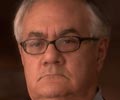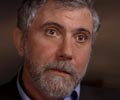Adam Davidson NPR/Planet Money
... Apparently he's a loyal Republican, or a longtime Republican, but he's just solid. He's the guy you want in the job. He was probably the smartest academic economist of the federal banking system, of central banking in general. ... There's no ideology there. This is just a well-respected pragmatist. And what he famously knows is the Great Depression. ... He's also an expert on the Japanese financial crisis. You can't think of anyone who would be more solid than this guy. And it was seen as a really good choice. ...
It's easy to contrast the two men, Henry Paulson and Ben Bernanke, this kind of headstrong, tall, bold bulldog in Henry Paulson and the much softer, quieter, bookish Bernanke. There's no question that in any discussion Bernanke's going to be more thoughtful. He's probably going to be more right. ... And it's not that Bernanke necessarily knew all of the details of some of the more obscure and brand-new structured products, but he understood as well as anyone alive how money flows through a system and what the crucial role of a central bank is in that process, and what happens when it breaks down.
Barney Frank Chair, House Financial Services Committee (D-Mass.)
A much more flexible guy, very intelligent, very thoughtful guy. Let me say both [Henry] Paulson, [Treasury Secretary, 2006-2009], and Bernanke [are] very decent, very well motivated, trying very hard to do the right thing. In Bernanke's case, a conservative, but not the rigid ideologue with regard to regulation. I think he shared Greenspan's pragmatism in setting interest rates. And Greenspan was this odd mix of pragmatist in the macro sense and rigid ideologue in the micro sense.
[Bernanke] is a very sober guy but very open, and -- I give him credit for this -- an economist that understands the limits of economic knowledge, so that he was not locked in to any one formula but was prepared to try things.
Mark Gertler Economist, New York University
He was considered a star coming out of graduate school. He had performed so well at MIT, and his reputation preceded him. In fact, I had heard about him before I met him. And then with his Depression paper, he really validated all of the praise that he had received coming out of graduate school. ...
What is his theory espoused in the Great Depression paper?
That it really was a breakdown of the financial system that was key. [Milton] Friedman and [Anna Jacobson] Schwartz had really pioneered the approach. They had gone back carefully and looked at all of the money and financial data, and Friedman and Schwartz argued that a key aspect was the Fed's failure to act when the economy was sinking in '29-30. '29-30 was a recession which was normal for the time. We would consider it a deep recession. GDP contracted about 10 percent. But in 1930 the Fed was at a crossroads, and it was just paralyzed.
That was an important first step. But the details needed to be filled out about why the Fed inaction led to such a great contraction. And one thing it did was it permitted the banking system to fail. It permitted prices to fall. The deflation ... basically led to a breakdown of the financial system. And really what Bernanke did was come in and really focus on this and get it out of the data and show that this was a very plausible candidate for the severity of the contraction. ...
What is Bernanke's personality?
He is pretty shy and unassuming. ... He was at first ill at ease in public, but that's no longer the case. And that's something that just evolved over time with the different roles that he has. He's a genuinely nice person, has enormous integrity, pretty good sense of humor.
Why the Fed?
His research. He has spent his academic life working on problems related to the Fed on financial crises, on inflation targeting, and I think after he finished being chairman at Princeton, he was looking for something new, ... and this opportunity to become a governor came up. To him, that seemed like the best of both worlds, because he could get in on the policy-making side, but a Fed governor is the kind of job where you still have a chance to think about things. It's not bureaucratic, administrative work. You're involved in policy-making, but part of your role is to sit back and think. Of course, not these days. They don't have time to. ...
Paul Krugman The New York Times
He hired me at Princeton. If he weren't chairman of the Fed, he'd been top of the list of people you'd be going to for advice and understanding all this stuff. He is, in fact, one of our leading scholars of the Great Depression. ...
His academic work is most nearly appropriate to this crisis. He's somebody who worried a lot about Japan and their crisis, saying, "What can we do so nothing like that ever happens here?" So if you were going to do the résumé, he would be the perfect man to be in his position. And the tragedy, of course, is knowing all of that and trying so hard, it's still not going very well.
What were you thinking when, in February 2006, he gets the nod to go down to the Fed?
I was pleased. We'd had a lot of appointments I didn't like, pretty obviously, from the Bush administration. The line a lot of us were seeing was ... that the administration, having had the fiasco over FEMA [Federal Emergency Management Agency], having had the fiasco over trying to put [former White House Counsel] Harriet Miers on the Supreme Court, when the Fed appointment came up, they actually had to choose somebody who was universally respected.
So no, this was happy. Even among the list of potentials, I think [this was] the choice that made most of the professionals in this field, left them most pleased.
Why? What was his philosophy in regard to how to deal with the economy? ... How would his Fed be different than [Alan] Greenspan's?
[Fed Chairman from 1987-2006] Greenspan is a political animal. He managed to work with the Clinton people, but Greenspan is an Ayn Rand disciple who really abused -- my view -- abused his position to help Bush get his tax cuts through. Greenspan, even before we knew about the financial mess-up, was a problematic figure. Bernanke -- I think everyone was a little surprised to hear that he was a registered Republican, not because he was known to be a liberal but because he didn't seem like a very political guy.
The Fed should be above politics, should be an institution that is primarily technocratic. It should be like the Army Corps of Engineers or the Supreme Court in better days. And Bernanke fit that model. He's an open-minded guy about monetary policy. There are people who have very rigid views on monetary policy, M2, you know, target the money supply or absolute price stability is the overriding goal above all else. And he's known to be somebody who's got a more flexible view about the role of the Fed altogether, the kind of thing that sensible people were looking to see in the Fed chairman.




